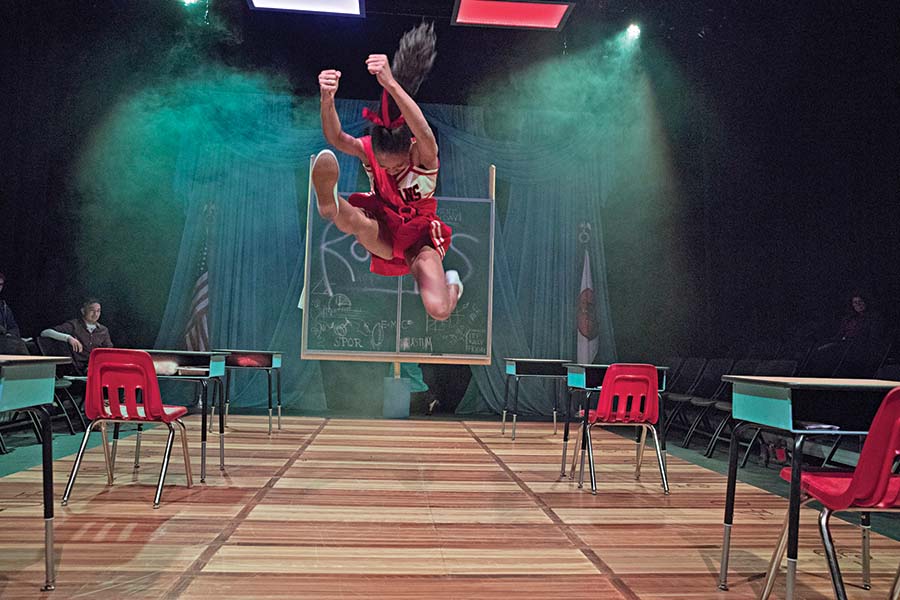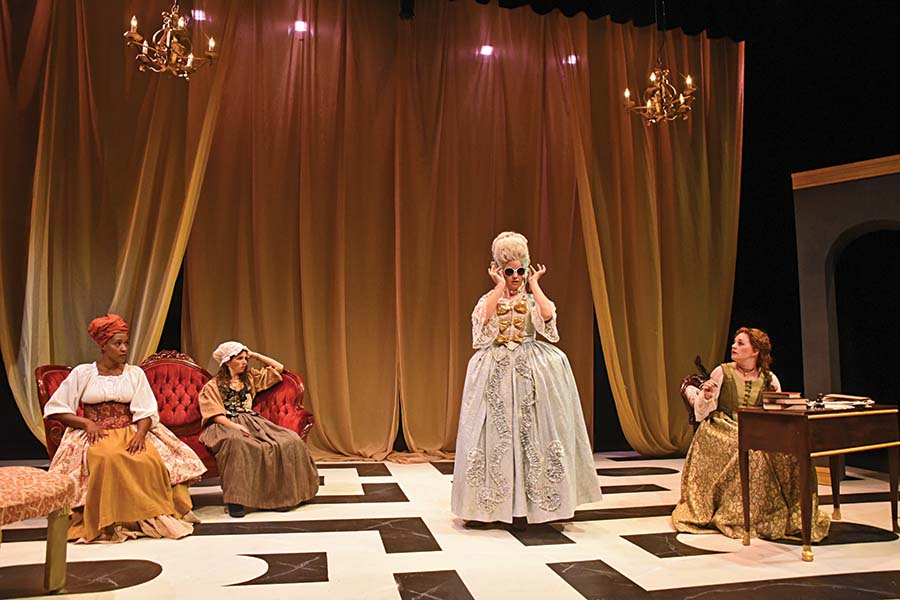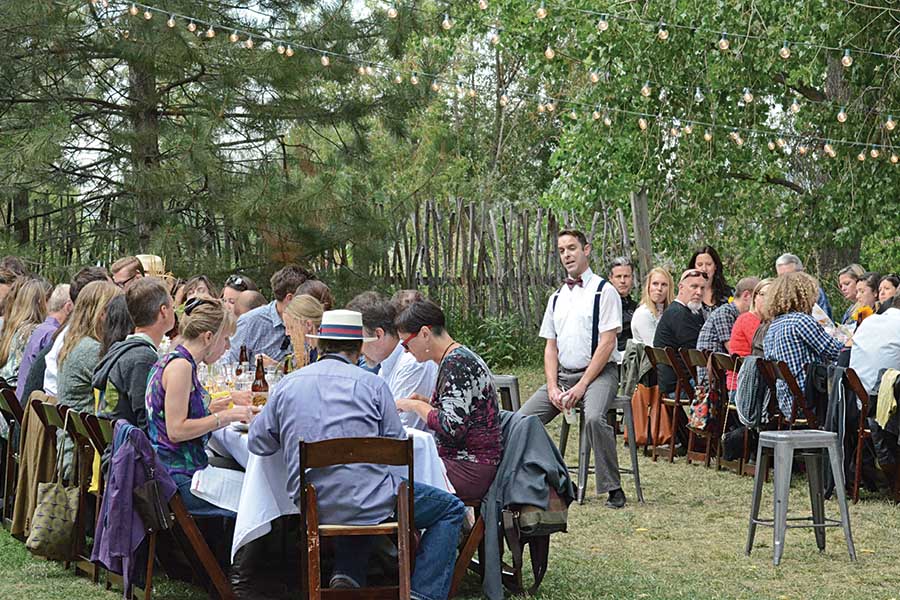
Bolder Colorado
How theatre in the college town 25 miles from Denver is rising to the occasion—and raising the stakes for the region.
Last October #MeToo went viral, and we’ve been reckoning with the repercussions ever since. But in Boulder, Colo., four theatre companies were already on the case. Because seasons take time to shape, the productions were gestures of foresight, not reaction—they were prophetic, not parasitic.
At Boulder Ensemble Theatre Company (BETC), its 12th season opened with a deft production of Lauren Gunderson’s The Revolutionists, about the 18th-century playwright Olympe de Gouges and three other women during France’s Reign of Terror, including an improbably touching Marie Antoinette. Meanwhile a troupe called the Catamounts convened the protagonists of Jane Eyre, Little Women, Pride and Prejudice, and Wuthering Heights for Jaclyn Backhaus’s archly clever You on the Moors Now. Square Product Theatre presented House of Gold, Gregory S. Moss’s cultural critique as told through the eyes of JonBenét Ramsey. And Local Theater Company presented a full production of a play workshopped during the 2016 installment of its Lab: Michael Yates Crowley’s The Rape of the Sabine Women by Grace B. Matthias, about a young woman who finds in the Roman tale of the Sabine women a way to understand her sexual assault at the hands of a high school football player.
Meanwhile, in the same period, just 25 miles away, Denver’s two most intellectually muscular theatres were differently engaged. At the regional powerhouse the Denver Center, rabble-rousing director Robert O’Hara was challenging subscribers with an all-male version of the Scottish play. And Curious Theatre Company was giving local audiences their first taste of playwright Branden Jacobs-Jenkins with his Southern Gothic family drama Appropriate.
It was the kind of one-two punch you might expect from theatres that have raised expectations about idea-wrestling theatre. Still, for years there’s been a sense that what Denver really needed to make it a more formidable player in the nation’s theatre scene was a third, mid-sized independent theatre to complement the Denver Center and Curious. Could it be, though, that the role of this dreamed-of “third theatre”—an outside catalyst to keep theatre in Colorado’s largest city on its toes—is already being played by a brace of artistically ambitious theatre companies in nearby Boulder?
Certainly a theatre critic can no longer put off the 40-minute drive to the foothill town until summer launches another season of the Colorado Shakespeare Festival (sometimes inspired, though often not inspired enough). Opening nights of the Boulder Ensemble or a weekend spent at Local’s new-play Lab are becoming required viewing.
“We’re not all telling the same stories,” says Pesha Rudnick, artistic director of Local Theater Company. And they’re certainly not telling their tales in the same way: The Catamounts plunge audiences into the wild and woolly, the experimental, like Dave Malloy’s rock musical Beowulf: A Thousand Years of Baggage. Or they’ll gather the group for their signature “FEEDs,” where food, drink, and performance are the draw.
Though they don’t actively coordinate their work, there’s a maturity and strategic savvy to the Boulder theatres’ collective approach to courting local audiences and connecting those audiences with the conversations taking place in the nation’s larger theatre hubs. And there’s a kind of Venn diagram overlap in their desire to forge and fortify community, even as the theatres remain satisfyingly divergent.
Boulder is hardly a theatre outlier. It’s home to Colorado’s higher education flagship, the University of Colorado Boulder, which has a theatre department, an MFA program, and the Colorado Shakespeare Festival, soon to be in its 61st season. The Boulder International Fringe Festival, meanwhile, is in its 14th year. The scene encompasses the brainy (Naropa University’s Contemporary Performance MFA program) and the brash (the young, Fringe-tinged company Band of Toughs).
None of the city’s four core companies are newly minted. BETC announced its 13th season at the start of March. Experimentally inclined, the Catamounts is in the midst of their seventh season, with its next offering slated to be Rausch, created in collaboration with choreographer Patrick Mueller and his experimental dance-theatre troupe Control Group Productions. And in April, Local will presents year seven of its Local Lab. Square Product produced its first show in 2006 as part of Boulder’s Fringe Festival.
It doesn’t hurt that three of the companies—BETC, Local, the Catamounts—have a home base in the recently renovated Dairy Arts Center.
“The Denver [Performing] Arts Complex, those theatres, are more about the big ticket, the blockbuster. So there’s room at the edges for experimental theatre, contemporary theatre,” says Matt Chasansky, manager of Boulder’s Office of Arts and Culture. “The artists in Boulder—we have tons of artists in contemporary practice here—were ready to take up that mantle.” And he says the data suggest that the “community has a hunger for contemporary theatre in a new way.”

In October, National Geographic named Boulder “the happiest city in the U.S.”
“Right—if you’re rich and white and liberal,” quips Local’s Rudnick, sitting in a local bookstore/cafe one chilly afternoon. “It’s a hilarious article.”
Know thy bubble and prick it might be the motto of these companies.
“I kept thinking, ‘What if American cities had three, four theatre companies?’” Rudnick says. “That sounds rather lofty, but what we’re dealing with now is a kind of explosion of the necessity of freedom of thought but also expression and gathering. This sort of grassroots need to find our place in the world but also in our cities, in our country, is incredibly robust right now.”
Sitting in an retrofitted Airstream trailer that acts as a conference room in the sort of communal non-office/office space that seems to be popping up all over Boulder and Denver, Catamounts artistic director Amanda Berg Wilson, executive director McPherson Horle, and company member Laura Lounge talk community-building. They’ve done their share, not just onstage but with their FEED events. The first took place on a local farm. “People freaked the fuck out about it,” recalls Wilson. “Pardon my language.” And watch out, Denver, they’re expanding: The most recent, “FEED: Love,” was the first to be held in the Mile High City.
At the fall installment, “FEED: Los Muertos,” a patron gave Horle the review she’d been dreaming of. The person told her, “You literally forced us to interact with people we don’t know. We did!”
The company takes to heart its tagline “Theatre for the Adventurous Palate.” At Beowulf patrons were seated at wooden banquet tables, the better to drink their ale (pale or browsn) while actors leapt atop them.
In a town with a notable population of researchers and developers—some affiliated with the university, others with the National Oceanic and Atmospheric Administration or nearby aerospace companies like Lockheed Martin Space Systems—BETC discovered and has been nurturing an unexpected relationship: with scientists.
“In the administrative sense, it’s niche marketing,” says Stephen Weitz, producing artistic director, and with wife Rebecca Remaly, co-founder of the company. “But what it really is, I think, is niche connecting with your community.”
Weitz learned that in finding people in town who connect with a particular individual production, BETC could open the door for new audience. “We stumbled into it by accident with the science community in our early season with our production of Copenhagen,” the play by Michael Frayn that recounts the meeting of physicists Niels Bohr and Werner Heisenberg. In 2014, BETC produced the world premiere of science historian and author Dava Sobel’s And the Sun Stood Still, about the scientific and spiritual challenges faced by astronomer Nicolaus Copernicus.
For its part, Local has taken care to introduce locals to the ins and outs of new-play development. Artistic director Rudnick, who has directed work at American Repertory Theater and has ties to the theatre communities on both coasts, has created a pipeline of new work to and from Boulder, enlisting major literary managers—Roundabout’s Jill Rafson and Oregon Shakes’ Lue Morgan Douthit—to guide the conversation among play, playwright, and audience.
It’s generative work, teaching audiences how to approach fledgling plays. “Our mission has always been to find and develop new American plays,” says Rudnick. “The ‘American’ kind of got inserted after we couldn’t get a visa for a Polish writer,” she admits with a laugh.
Cultivating community can also mean challenging the so-called community. Once dubbed the People’s Republic of Boulder, the city can still be too self-satisfied with its politics of concern, given its wealth and lack of racial diversity.
In August, Square Product artistic director Emily K. Harrison posted an open letter about House of Gold. The play had cut very close to home, with its tale of a local tragedy; Boulder is where wee beauty pageant contestant JonBenét Ramsey was found murdered in December 1996. Critical response to Moss’s play was divided. Was it a re-violation? Or was it a “surreal ride…surprisingly effective and even profound at times,” as the Denver Post reviewer wrote?
“Our production of House of Gold, presented less than half a mile from the home where JonBenét Ramsey took her last breath, honors her memory, and the memory of so many girls and women trapped—even doomed—by the expectations of those around them, by the expectations of a culture that tolerates so much violence. We chose to produce this play knowing full well that it would make people uncomfortable, and that it would challenge an audience to sit with that discomfort, especially given the lack of resolution both in life and art.”

It’s hard to ignore how significant a role the Dairy Arts Center has played in this uptick in robust theatremaking.
“It’s really nice to have BETC’s audience flowing out as our audience is flowing out, and maybe there’s a weird dance performance or an art installation,” says Catamounts’ Lounge. “Our audiences are mixing and it’s building our audience. It’s nurturing all of us.”
Horle agrees, saying, “With no effort on our part, the Dairy has become part of the Catamounts brand.” When the Dairy was closed for renovations and the company underlined that fact that a production would be elsewhere, audience members still showed up like homing pigeons at the Dairy. “We have been caught up in their net, which is so broad and so wide, we can’t escape.”
“And, on the flip side,” Wilson interjects, “we bring people in.”
It’s a role the Dairy relishes. After raising $5.4 million to complete extensive renovations to its lobby and three theatres, the Dairy put in place “a partner organization model.”
“Every two years we identify six of our ongoing renting organizations—three thea-tre companies and three dance companies—to become partner organizations,” wrote the Dairy’s new executive director Melissa Fathman in an email. “In addition to getting priority booking, the six orgs meet regularly to discuss common goals, bounce ideas around, discuss the city’s cultural plan, or generally just lift each other up.”
There is a downside: Of the four theatres, Square Product is the one without a berth at the Dairy. “There’s very limited appropriate space for production,” explains Harrison, who is teaching in London this semester.
Boulder’s high-priced real estate market raises questions of affordability across the board. Office of Arts and Culture’s Chasansky agrees that “the city presents a unique challenge to the theatres. While we’re a great town for artists to produce and display and perform their work, we’re not a great town for them to live in because we’re so unaffordable.”
Harrison isn’t even sure it’s a great town to create art in, if you can’t secure a home theatre. Because funders like theatres to have a base, Harrison’s worries that “the Dairy’s priority booking [system] has an effect on our ability to secure funding for production.”
For the theatres with a home at the Dairy, permanence has allowed them to drill down into their programming. Square Product, meanwhile, remains a vagabond enterprise.
Even for those with the Dairy berth, the work these companies produce doesn’t come cheap. “It’s important to me that the right people be in the room,” Rudnick says. “Sometimes that’s a dramaturg, sometimes that’s five Equity actors.” Local’s March world premiere of Wisdom From Everything, written by Mia McCullough and directed by Seema Sueko, had a cast of Middle Eastern and South Asian actors, which required a national call. “So, yes,” Rudnick concedes, “we don’t do five shows a season because we couldn’t afford to do it.”
BETC has stepped up to the five-show threshold over the last several years, and will again in its 13th. On the slate is The Wolves, the Pulitzer finalist by Sarah DeLappe, which Weitz calls “such a profound play about the lives of young women—what we know and what we think we know. And maybe what we’re scared to find out.” He adds, “We’ll also be taking our third trip to the Gunderworld,” referring to Gunderson’s Pride and Prejudice sequel Miss Bennet: Christmas at Pemberley.
The company is tripling the number of actors, says Weitz. Of the Boulder indies, BETC has the largest budget, and this year the board and Weitz have put in place a plan to grow the budget by $100,000. “If we want to take a big step forward we have to keep growing and being a more recognized regional powerhouse,” says Weitz. “Some of that means bigger plays, more actors, more money into production, sprinkling titles that the audience may have more familiarity with but that will still fit our goals as far as bringing new, exciting work to the Boulder area.”
The Catamounts’ Wilson hopes for more collaboration among larger institutions and companies like hers. “The Denver Center is a silo, the university is a silo, the Arvada Center [a longtime regional presence] is a silo—the only resource they’re really sharing is actors,” she says. But higher-level exchanges are already happening: Wilson had just concluded her stint as director of the Denver Center’s reconceived immersive production of Michael John LaChiusa and George C. Wolfe’s The Wild Party, and Weitz has also directed for the Denver Center. “I continue to think this will be a robust theatre community on the national level when there’s more porousness between the big institutions and the more edgy ones,” Wilson says.
Call it healthy competition, call it cross-pollination: The companies in Boulder have begun to produce work and take chances with enough consistency that a creative flow between deep-pocketed and modest, between Denver and Boulder, looks poised to redefine the region’s place in the American theatre.
Lisa Kennedy is a writer based in Denver.
